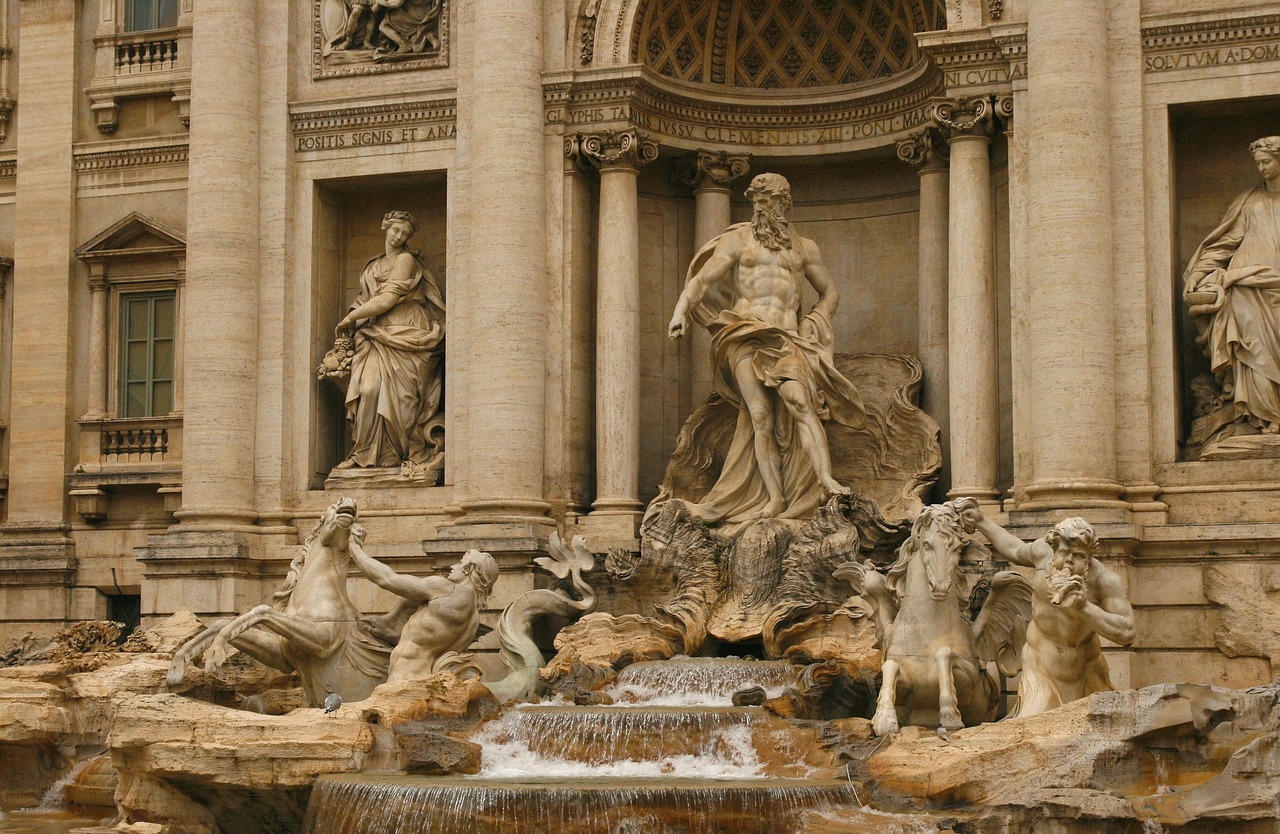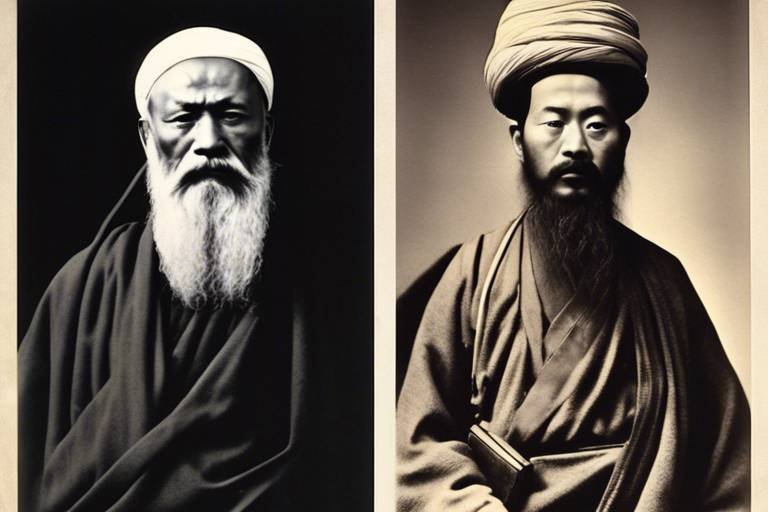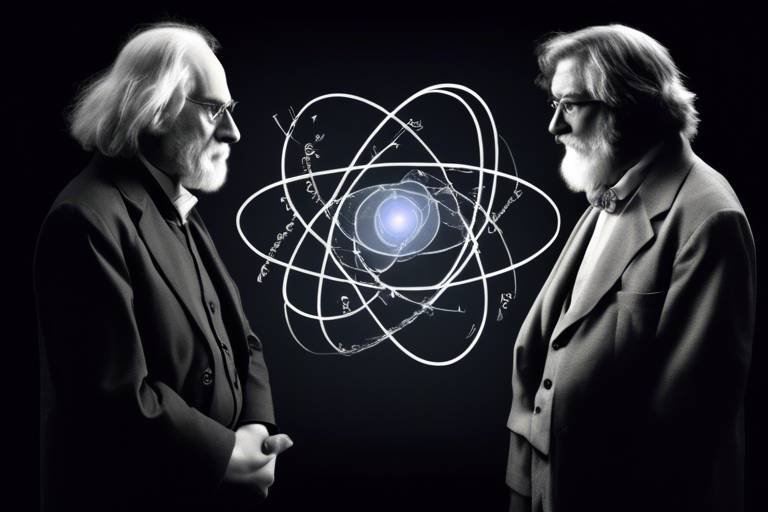Philosophy 101: Exploring Ancient Philosophy
Welcome to the fascinating world of ancient philosophy, where the seeds of thought were sown by some of the greatest minds in history. This article delves into the foundational concepts and thinkers of ancient philosophy, examining their ideas and contributions that shaped Western thought and continue to influence contemporary philosophical discussions. Have you ever wondered how our understanding of ethics, politics, and existence was shaped? Well, let’s embark on this intellectual journey together!
Philosophy, as we know it, began in ancient Greece, a period marked by remarkable intellectual exploration. Key figures like Thales and Pythagoras emerged, each contributing revolutionary ideas that set the stage for future philosophical inquiry. Thales, often regarded as the first philosopher, proposed that water is the fundamental substance of all things. Imagine that—a single element being the source of everything around us! Pythagoras took this a step further, not just with his famous theorem but by suggesting that numbers hold the key to understanding the universe. These early thinkers were not merely pondering abstract concepts; they were laying the groundwork for a new way of understanding the world.
One of the most profound metaphors in philosophy comes from Plato—the allegory of the cave. Picture this: prisoners chained inside a dark cave, only able to see shadows cast on the wall. These shadows represent the world of appearances, a mere reflection of reality. When one prisoner escapes and discovers the outside world, he realizes that the true forms of objects exist beyond the cave. This powerful story illustrates the difference between the world of appearances and the world of forms, emphasizing the importance of enlightenment and knowledge. It begs the question: how often do we find ourselves trapped in our own caves, mistaking shadows for reality?
Next, we turn to Aristotle, a towering figure whose contributions span various fields, including ethics, politics, and metaphysics. Aristotle believed in the concept of virtue ethics, which emphasizes character and the importance of moral virtues. He argued that happiness is the ultimate goal of human life, achieved through virtuous living. In politics, his work "Politics" laid the groundwork for understanding governance and civic responsibility. Aristotle’s scientific inquiries also transformed our approach to the natural world, establishing a framework that influenced countless generations of thinkers. His legacy is a testament to the interconnectedness of philosophy and science, showcasing how ancient ideas continue to resonate today.
Now, let’s dive into the Socratic method, a technique developed by Socrates that involves asking a series of questions to stimulate critical thinking and illuminate ideas. Imagine sitting in a lively discussion, where every answer leads to another question, peeling back layers of understanding. This method not only fosters ethical inquiry but also encourages individuals to engage deeply with their beliefs. Socrates believed that through dialogue, one could uncover truths about morality and justice. His influence on philosophy is immeasurable, as generations of thinkers have adopted and adapted his questioning style.
In ancient philosophy, two prominent schools emerged: Epicureanism and Stoicism. Epicureanism advocates for the pursuit of pleasure and tranquility, suggesting that the ultimate goal is to attain a state of happiness free from pain. Imagine a life where you savor every moment, seeking joy in simple pleasures. On the other hand, Stoicism emphasizes virtue, resilience, and self-control in the face of adversity. Stoics teach that we should focus on what we can control and accept what we cannot. Both philosophies offer valuable insights into the human experience and remain relevant in our fast-paced, often chaotic modern lives.
The intersection of ancient philosophy and religion is a captivating area of study. Philosophical ideas have significantly shaped early religious thought, influencing the development of theological concepts. For example, the notion of a rational universe governed by laws can be traced back to ancient philosophical discussions. Many early theologians, such as Augustine, integrated Platonic ideas into Christian doctrine, creating a rich tapestry of thought that continues to evolve today. The philosophical quest for truth and understanding often parallels religious exploration, prompting us to ponder the deeper meanings of existence.
Throughout ancient history, various philosophical schools emerged, each offering unique perspectives. The Cynics challenged societal norms, advocating for a life in accordance with nature. The Skeptics questioned the possibility of certain knowledge, promoting a philosophy of doubt and inquiry. The Neoplatonists sought to reconcile Platonic thought with religious beliefs, emphasizing the importance of the One as the source of all existence. These schools not only enriched the philosophical landscape but also encouraged critical engagement with ideas, fostering an environment of intellectual growth.
As we conclude our exploration of ancient philosophy, it's essential to reflect on its enduring legacy. The ideas and concepts developed by these early thinkers continue to influence contemporary philosophical debates. Whether discussing ethics, politics, or the nature of reality, ancient philosophy provides a foundation that informs our understanding of the world today. Its role in shaping modern thought is undeniable, reminding us that the quest for knowledge and understanding is a timeless endeavor.
- What is the main focus of ancient philosophy? Ancient philosophy primarily focuses on fundamental questions regarding existence, knowledge, ethics, and the nature of reality.
- Who are some key figures in ancient philosophy? Key figures include Socrates, Plato, Aristotle, Epicurus, and the Stoics.
- How does ancient philosophy influence modern thought? Ancient philosophical concepts continue to shape discussions in ethics, politics, and science, providing a framework for contemporary philosophical inquiry.

The Birth of Philosophy
Philosophy, as we know it today, traces its roots back to ancient Greece, a time when thinkers began to question the world around them in ways that had never been attempted before. Imagine a bustling marketplace in Athens, where the air is thick with the scent of olives and the sound of lively debate. It was here that the seeds of philosophical inquiry were sown, thanks to brilliant minds like Thales and Pythagoras. These early philosophers were not just pondering abstract concepts; they were laying the groundwork for future generations to explore the very nature of existence.
Thales, often regarded as the first philosopher, proposed that water is the fundamental substance of all things. This idea was revolutionary at the time, as it shifted the focus from mythological explanations of the universe to naturalistic ones. Thales' belief that everything could be traced back to a single substance was a significant departure from the prevailing thought, which often attributed events to the whims of gods. This transition to a more rational understanding of the world was like turning on a light in a dark room, illuminating paths for future inquiry.
Pythagoras, on the other hand, is best known for his contributions to mathematics, but his philosophical ideas were equally influential. He introduced the concept that numbers and mathematical relationships underpin the cosmos. To him, reality was not just a physical entity but a harmonious structure governed by mathematical laws. This idea that mathematics and philosophy are intertwined opened up new avenues for exploration, leading to questions about the nature of reality, knowledge, and existence itself.
As we delve deeper into the birth of philosophy, we encounter other key figures who contributed to this intellectual revolution. Thinkers like Heraclitus, who famously stated that "you cannot step into the same river twice," challenged the notion of permanence and introduced the idea of change as a fundamental aspect of life. Meanwhile, Parmenides argued the opposite, claiming that change is an illusion and that reality is unchanging. These conflicting views sparked debates that would shape the trajectory of philosophical thought for centuries.
In this vibrant milieu of ideas, we also see the emergence of the pre-Socratic philosophers, who set the stage for more systematic approaches to philosophy. They began to explore questions about the nature of the universe, the essence of being, and the principles that govern existence. Their inquiries were not just academic; they were deeply intertwined with the quest for knowledge and understanding that defines human experience.
Ultimately, the birth of philosophy in ancient Greece was marked by a shift from mythos to logos, from stories of gods and heroes to rational inquiry and critical thinking. This transformation was akin to a caterpillar emerging from its cocoon, revealing the potential for profound intellectual growth. The legacy of these early philosophers continues to resonate today, as their questions and ideas remain central to our understanding of the world and ourselves.
- What is the significance of ancient Greek philosophy?
Ancient Greek philosophy laid the groundwork for Western thought, influencing various fields including science, politics, and ethics. - Who were the key figures in ancient philosophy?
Key figures include Thales, Pythagoras, Socrates, Plato, and Aristotle, each contributing uniquely to philosophical discourse. - How did ancient philosophy influence modern thought?
Many contemporary philosophical debates and theories are rooted in the ideas and questions posed by ancient philosophers.

Plato's Allegory of the Cave
Imagine being trapped in a dark cave for your entire life, shackled in such a way that you can only see the wall in front of you. Behind you, there is a fire, and between you and the fire, people walk along a path carrying various objects. The shadows of these objects are cast on the wall you face, and since you have never seen the outside world, these shadows are your only reality. This is the essence of , a profound metaphor that illustrates the difference between the world of appearances and the world of forms.
In this allegory, Plato invites us to ponder the nature of reality and knowledge. The cave represents the limited perspective of most people, who only perceive the shadows of true objects. The journey of the prisoner who escapes the cave symbolizes the philosopher's quest for enlightenment and understanding. When the prisoner finally breaks free and ventures outside, he is initially blinded by the sunlight, which represents the overwhelming truth of reality. Over time, however, he becomes accustomed to the light and realizes that the world he once knew was merely a fraction of existence.
Plato uses this allegory to emphasize the importance of education and the pursuit of knowledge. He argues that only through philosophical inquiry can individuals escape the confines of ignorance and grasp the true nature of reality. The allegory also serves as a critique of society; it suggests that many people are content to live in ignorance, clinging to the familiar shadows rather than seeking the truth. This idea resonates even today, as we often find ourselves surrounded by distractions that obscure our understanding of the world.
Furthermore, the allegory raises critical questions about perception and belief. How often do we accept what we see without questioning its authenticity? Are we, too, prisoners in our own metaphorical caves? Plato's allegory encourages us to challenge our beliefs and seek deeper truths, urging us to step out of our comfort zones and embrace the unknown.
To better understand the allegory, let's break down its key elements:
| Element | Description |
|---|---|
| The Cave | A metaphor for the limited perspective of human beings. |
| The Shadows | Represent the illusions and false realities we perceive. |
| The Escape | The journey of enlightenment and the pursuit of knowledge. |
| The Sun | Symbolizes the ultimate truth and understanding. |
In conclusion, Plato's Allegory of the Cave is not just a philosophical concept; it is a call to action. It challenges us to question our realities and strive for a deeper understanding of the world around us. The allegory remains relevant today, reminding us that the journey towards enlightenment is ongoing and that we must remain vigilant in our pursuit of knowledge.
- What is the main message of Plato's Allegory of the Cave?
The main message is that most people live in ignorance, perceiving only shadows of reality, and that true knowledge requires a journey of enlightenment. - How does the allegory relate to modern society?
It highlights how distractions and misinformation can keep us from understanding deeper truths about our world. - What does the sun represent in the allegory?
The sun symbolizes the ultimate truth and knowledge that one can achieve through philosophical inquiry.

Aristotle's Contributions
Aristotle, a towering figure in ancient philosophy, was not just a student of Plato but a prolific thinker who ventured far beyond the boundaries of his teacher's ideas. His contributions span a multitude of fields, including ethics, politics, metaphysics, biology, and poetics, making him one of the most influential philosophers in Western thought. Imagine a Renaissance man, centuries before the Renaissance even existed; that's Aristotle for you!
Starting with ethics, Aristotle introduced the concept of virtue ethics, which emphasizes the importance of character and the virtues that a good person should embody. He believed that achieving eudaimonia, often translated as "flourishing" or "happiness," is the ultimate goal of human life. This idea is beautifully encapsulated in his famous quote, "The good for man is an activity of the soul in accordance with virtue." In simpler terms, living well means living virtuously, and Aristotle provided a framework for understanding how to cultivate these virtues.
Transitioning to politics, Aristotle's work, Politics, is a foundational text that examines various forms of government and their implications for the citizens. He famously categorized governments into three ideal forms—monarchy, aristocracy, and polity—and their corrupt counterparts—tyranny, oligarchy, and democracy. Aristotle argued that the best government is one that promotes the common good and allows citizens to achieve their potential, showcasing his belief in the balance between individual rights and the community's needs.
In the realm of metaphysics, Aristotle's concept of substance and his exploration of potentiality and actuality laid the groundwork for future philosophical inquiry. He posited that everything in the universe is composed of substances that possess both form and matter. This duality is crucial for understanding change and existence, leading to his famous assertion that "to be is to be a substance." In other words, understanding the essence of things is key to understanding reality itself.
Aristotle didn't stop at philosophy; his contributions to science were equally groundbreaking. He is often referred to as the father of biology due to his extensive studies on living organisms. His observations and classifications of animals were so detailed that they remained the standard for centuries. He believed in the importance of empirical observation, which is a cornerstone of the scientific method we use today.
Furthermore, Aristotle's influence extends into the realm of poetics. His work, Poetics, explores the nature of tragedy and epic poetry. He famously outlined the elements of a good tragedy, emphasizing the importance of catharsis—the emotional release experienced by the audience. His ideas on narrative structure and character development continue to inform literature and storytelling to this day.
In summary, Aristotle's contributions are vast and varied, impacting not only philosophy but also science, politics, and the arts. His ability to ask profound questions and seek empirical answers set a precedent for future generations of thinkers. The legacy of Aristotle is not just in his writings but in the way he shaped the intellectual landscape of the Western world. To put it simply, Aristotle didn't just contribute to philosophy; he laid the very foundations upon which much of modern thought stands today.
- What is Aristotle known for? Aristotle is known for his contributions to various fields including ethics, politics, metaphysics, biology, and poetics.
- What is virtue ethics? Virtue ethics is a philosophical approach that emphasizes the role of character and virtue in moral philosophy, as proposed by Aristotle.
- How did Aristotle influence science? Aristotle's empirical observations and classifications of living organisms laid the groundwork for biological studies and the scientific method.
- What is the essence of Aristotle's political philosophy? Aristotle believed that the best government promotes the common good and allows for individual flourishing.

Socratic Method and Ethics
The Socratic Method, named after the ancient Greek philosopher Socrates, is a form of cooperative argumentative dialogue that stimulates critical thinking and illuminates ideas. Socrates believed that the best way to understand ethical concepts was through questioning and dialogue, rather than through dogmatic assertions. Imagine sitting down with a friend over coffee, and instead of stating your opinion outright, you start asking questions that lead them to discover their own beliefs. This method is more about the journey of thought than reaching a destination. It’s like guiding someone through a maze where they uncover the truth at every turn.
At its core, the Socratic Method is about fostering a deeper understanding of ethics. Socrates would often challenge his interlocutors by asking them to define concepts like justice, virtue, or goodness. Through this process, he highlighted the inconsistencies in their beliefs, prompting them to refine their thoughts. For instance, when discussing justice, Socrates might ask, "Is it just to harm others, even if they have harmed you?" This kind of questioning encourages individuals to reflect on their moral frameworks and understand the implications of their beliefs.
Moreover, the Socratic Method is not just about questioning; it also emphasizes the importance of ethical living. Socrates famously claimed that "the unexamined life is not worth living." This statement underscores the idea that ethics is not merely an abstract concept but a practical guide for living. By engaging in self-reflection and dialogue, individuals can cultivate a more thoughtful and ethical approach to their lives. It's akin to tuning a musical instrument; without careful adjustments and checks, the music produced would be out of harmony.
In today’s world, the Socratic Method remains highly relevant. It encourages individuals to engage in thoughtful discussions about morality and ethics, rather than accepting beliefs at face value. In educational settings, you might find teachers employing this method to provoke critical thinking among students, helping them to explore complex ethical dilemmas. This approach not only enhances understanding but also fosters a sense of responsibility towards one’s beliefs and actions.
Ultimately, the Socratic Method serves as a powerful tool for ethical inquiry. It invites us to question our assumptions, engage in meaningful dialogues, and strive for a deeper understanding of what it means to live ethically. By embracing this method, we can cultivate a more reflective society, where individuals are not only aware of their beliefs but are also willing to challenge and refine them through thoughtful conversation.
- What is the Socratic Method? The Socratic Method is a form of dialogue that encourages critical thinking through questioning, helping individuals explore ethical concepts.
- How did Socrates influence ethics? Socrates emphasized the importance of self-examination and dialogue in understanding ethical beliefs, leading to a more thoughtful approach to morality.
- Why is the Socratic Method still relevant today? It encourages open discussion and critical thinking, making it valuable in educational settings and ethical discussions in modern society.

Epicureanism and Stoicism
When we dive into the vibrant world of ancient philosophy, two schools of thought stand out: Epicureanism and Stoicism. Both philosophies emerged in ancient Greece and offered unique perspectives on how to live a fulfilling life. While they seem to be at odds with one another, they share a common goal: the pursuit of happiness and tranquility. Imagine standing at a crossroads; on one path, you have Epicureanism, which beckons you with promises of pleasure and enjoyment, while on the other, Stoicism invites you to embrace resilience and virtue. Which path would you choose?
Epicureanism, founded by the philosopher Epicurus, teaches that the highest good is to seek pleasure and avoid pain. But hold on! This doesn’t mean indulging in hedonistic excess. Epicurus emphasized the importance of simple pleasures, such as friendship, knowledge, and the appreciation of nature. He believed that true happiness comes from cultivating a serene state of mind rather than chasing after fleeting pleasures. In fact, he famously stated, “Pleasure is the absence of pain.” This philosophy encourages us to reflect on our desires and choose wisely, focusing on what truly brings joy and contentment.
On the flip side, we have Stoicism, a philosophy championed by thinkers like Seneca and Marcus Aurelius. Stoicism teaches that virtue, wisdom, and self-control are the keys to a good life. Unlike Epicureanism, which seeks pleasure, Stoicism encourages individuals to find peace through acceptance and resilience in the face of life's challenges. Imagine facing a storm; while Epicureans might seek shelter, Stoics would stand firm, accepting the tempest as a part of life. They believed that our reactions to events, rather than the events themselves, determine our happiness. This perspective fosters a sense of inner strength and tranquility.
Both philosophies offer valuable insights, and their teachings can often complement each other. Here’s a quick comparison to illustrate their differences:
| Aspect | Epicureanism | Stoicism |
|---|---|---|
| Goal | Seek pleasure and avoid pain | Achieve virtue and wisdom |
| View on Emotions | Embrace positive emotions, minimize pain | Control emotions, accept fate |
| Nature of Happiness | Derived from simple pleasures | Derived from inner peace and virtue |
| Community | Value friendships and social connections | Value community but emphasize individual virtue |
In modern times, the teachings of both Epicureanism and Stoicism resonate with many. Epicureanism reminds us to savor life’s moments, to appreciate the little things that bring joy, while Stoicism teaches us to maintain our composure and integrity in the face of adversity. It’s like having the best of both worlds; you can enjoy life’s pleasures while also cultivating a strong, resilient character.
As we navigate through our lives filled with uncertainties, these ancient philosophies provide timeless wisdom. They challenge us to reflect on our values and priorities. Are we seeking momentary pleasures, or are we striving for lasting fulfillment through virtue? Perhaps the answer lies in finding a balance between the two, allowing us to live a rich, meaningful life.
- What is the main difference between Epicureanism and Stoicism?
Epicureanism focuses on seeking pleasure and avoiding pain, while Stoicism emphasizes virtue, wisdom, and resilience in the face of challenges. - Can I practice both Epicureanism and Stoicism?
Absolutely! Many find that combining the insights from both philosophies can lead to a more balanced and fulfilling life. - How can I apply these philosophies in my daily life?
Start by identifying what brings you joy and fulfillment (Epicureanism) while also practicing self-control and acceptance in challenging situations (Stoicism).

Influence of Ancient Philosophy on Religion
When we dive into the rich waters of ancient philosophy, we quickly discover that its ripples extend far beyond the realms of abstract thought. In fact, the interplay between ancient philosophy and religion is like a dance, where each step influences the other, creating a complex tapestry of ideas that have shaped human understanding for centuries. Think about it: how did the philosophical inquiries of figures like Plato and Aristotle seep into the spiritual fabric of their time? Their explorations of existence, morality, and the nature of the divine laid a foundational groundwork for religious thought that is still relevant today.
One of the most significant contributions of ancient philosophy to religion is the way it prompted early thinkers to question and refine their beliefs. For example, Plato's Theory of Forms introduced the idea that there exists a higher realm of truth beyond our physical world. This concept resonated deeply within religious contexts, suggesting that earthly experiences are mere shadows of a more profound reality. Such ideas encouraged followers to seek enlightenment and a deeper understanding of their faith, moving beyond mere rituals to a more profound spiritual awakening.
Moreover, the ethical frameworks established by philosophers like Aristotle and the Stoics offered a moral compass that influenced religious teachings. Aristotle's emphasis on virtue ethics, which advocates for the development of good character through habitual practice, parallels many religious doctrines that stress moral living. This convergence of thought led to a richer dialogue between philosophy and religion, where ethical living became a shared goal.
Interestingly, the ancient schools of thought also contributed to the way religious narratives were interpreted. For instance, the Cynics, who advocated for a life in accordance with nature and rejection of societal conventions, inspired early Christian asceticism. This influence is evident in the teachings of early Church Fathers, who often echoed Cynic disdain for materialism and promoted a life of simplicity and virtue.
To illustrate this relationship further, let’s examine some key philosophical ideas and their religious counterparts:
| Philosophical Idea | Religious Counterpart |
|---|---|
| Plato's Theory of Forms | Heavenly Realm in Christianity |
| Aristotle's Virtue Ethics | Moral Teachings in Various Religions |
| Cynicism's Rejection of Materialism | Christian Asceticism |
Furthermore, the Stoics’ emphasis on inner peace and resilience in the face of adversity found its way into religious teachings about suffering and the human condition. Their belief that we should focus on what is within our control mirrors many religious doctrines that advocate for trust in a higher power during difficult times. This shared wisdom highlights a universal quest for understanding and coping with life's challenges.
As we reflect on the influence of ancient philosophy on religion, it becomes clear that this relationship is not merely historical; it continues to resonate in our contemporary discussions about faith and ethics. Many modern theological debates still grapple with philosophical questions regarding the nature of existence, the problem of evil, and the pursuit of truth. Thus, the legacy of ancient philosophy remains alive, encouraging us to think critically about our beliefs and the world around us.
- How did ancient philosophy influence early religious thought? Ancient philosophers introduced critical thinking and ethical frameworks that shaped the understanding of morality and the divine in religious contexts.
- What is the significance of Plato's Theory of Forms in religion? Plato's Theory of Forms suggests that there is a higher reality beyond our physical world, which parallels many religious beliefs about an ultimate truth or divine realm.
- Are there modern implications of ancient philosophical ideas in religion? Yes, many contemporary theological discussions still engage with ancient philosophical concepts, particularly regarding ethics, existence, and the nature of suffering.

Philosophical Schools of Thought
When we dive into the rich tapestry of ancient philosophy, we uncover a multitude of schools of thought that each offer unique perspectives on existence, knowledge, and ethics. These schools were not just academic exercises; they were vibrant communities of thinkers passionately engaged in the quest for truth. Imagine a bustling marketplace of ideas, where each philosopher sets up their stall, presenting their beliefs and challenging the views of others. Among the most notable schools are the Cynics, Skeptics, and Neoplatonists, each contributing to the philosophical landscape in profound ways.
The Cynics, led by figures such as Diogenes, championed a lifestyle of simplicity and self-sufficiency. They believed that true happiness could be found by living in accordance with nature and rejecting societal conventions. Diogenes famously roamed the streets with a lantern in broad daylight, claiming to be searching for an honest man. This radical approach to life questioned the very fabric of social norms and encouraged individuals to seek authenticity over material wealth.
On the other end of the spectrum, we have the Skeptics. This school, with prominent thinkers like Pyrrho, emphasized the idea that certainty is elusive. They argued that for every assertion, there could be an equally valid counter-argument. This led to a profound inquiry into the nature of knowledge itself. The Skeptics didn’t just stop at questioning knowledge; they pushed for a life of tranquility, suggesting that by suspending judgment, one could achieve peace of mind. Imagine walking through a foggy landscape, where every path seems uncertain, yet finding solace in the journey itself.
Then we have the Neoplatonists, who sought to synthesize Platonic thought with mystical elements. Thinkers like Plotinus introduced the idea of a singular source of all reality, the One, from which everything emanates. This view not only influenced philosophy but also had a significant impact on early Christian theology. The Neoplatonists believed that through philosophical contemplation, one could ascend to higher levels of reality, akin to climbing a mountain where each peak reveals a more profound understanding of existence.
In addition to these schools, there were many others, each wrestling with fundamental questions about life, ethics, and the universe. The diversity of thought during this period is a testament to humanity's relentless pursuit of understanding. It’s fascinating to see how these ancient philosophies continue to resonate today, influencing modern philosophical debates and even shaping contemporary ethical discussions.
| Philosophical School | Key Ideas | Notable Thinkers |
|---|---|---|
| Cynicism | Simplicity, self-sufficiency, living according to nature | Diogenes |
| Skepticism | Suspension of judgment, questioning certainty | Pyrrho |
| Neoplatonism | Hierarchy of reality, the One, mystical contemplation | Plotinus |
In conclusion, the philosophical schools of thought from ancient times were not just isolated ideas but interconnected dialogues that shaped the very foundations of Western philosophy. They encouraged critical thinking and fostered a culture of inquiry that is still relevant in our quest for understanding today. So, as we navigate our own philosophical journeys, we can draw inspiration from these ancient thinkers who dared to question, challenge, and explore the depths of human existence.
- What is the main focus of Cynicism? Cynicism emphasizes living a life of virtue in accordance with nature and rejecting societal norms.
- How do Skeptics view knowledge? Skeptics believe that certainty is unattainable and advocate for suspending judgment to achieve peace of mind.
- What is the significance of Neoplatonism? Neoplatonism combines Platonic philosophy with mystical elements, influencing both philosophy and early religious thought.

The Legacy of Ancient Philosophy
The legacy of ancient philosophy is a rich tapestry that weaves through the very fabric of modern thought, influencing various disciplines from science to ethics. Imagine a vast tree with roots that dig deep into the soil of human inquiry; this tree represents the foundational ideas that philosophers like Plato and Aristotle planted centuries ago. Their thoughts are not merely relics of the past but living ideas that continue to inspire and challenge our understanding of the world. For instance, when we ponder the nature of reality or the essence of justice, we are often echoing the questions posed by these ancient thinkers.
One of the most significant impacts of ancient philosophy is its role in shaping the **framework of Western education**. The Socratic method, which emphasizes dialogue and critical questioning, is still a cornerstone of modern pedagogical practices. This method encourages students to engage actively with ideas rather than passively receive information. It's akin to planting seeds of curiosity, allowing students to cultivate their understanding through exploration and discussion.
Moreover, ancient philosophical concepts have permeated various fields, including politics, ethics, and science. For example, Aristotle's notions of virtue ethics have laid the groundwork for contemporary discussions about morality. His idea that virtue lies in the balance between extremes resonates today, as we navigate complex ethical dilemmas in personal and societal contexts. In politics, the discussions initiated by Plato regarding the ideal state and governance continue to inform political theory and practice. His vision of a philosopher-king raises questions about leadership and the responsibility of those in power, a topic that remains ever-relevant.
Additionally, the ancient philosophies of Epicureanism and Stoicism offer profound insights into how we can lead fulfilling lives amidst the chaos of modern existence. Epicureanism teaches us the value of **pleasure** and tranquility, urging us to seek joy in simple things. On the other hand, Stoicism emphasizes resilience and virtue, guiding us to maintain composure in the face of adversity. These philosophies provide practical frameworks for navigating life's challenges, proving that ancient wisdom is not just theoretical but actionable in our daily lives.
To illustrate the enduring influence of ancient philosophy, consider the following table that highlights key contributions from various ancient philosophers and their modern implications:
| Philosopher | Contribution | Modern Implication |
|---|---|---|
| Plato | Theory of Forms | Influences metaphysics and epistemology in contemporary philosophy. |
| Aristotle | Ethics and Virtue | Framework for modern ethical theories and moral philosophy. |
| Socrates | Socratic Method | Foundation of critical thinking and dialogue in education. |
| Epicurus | Pursuit of Happiness | Guides modern approaches to well-being and mental health. |
| Seneca | Stoicism | Influences modern self-help and resilience practices. |
In conclusion, the legacy of ancient philosophy is not confined to dusty books or academic discussions; it is a vibrant part of our everyday lives. It challenges us to think critically, live ethically, and engage deeply with the world around us. As we face new challenges in our rapidly changing society, the wisdom of ancient philosophers provides a compass to navigate the complexities of life. Their ideas remind us that while times may change, the fundamental questions about existence, morality, and the nature of knowledge remain timeless.
- What is the main contribution of ancient philosophy to modern thought?
Ancient philosophy laid the groundwork for critical thinking, ethics, and political theory, which continue to influence contemporary discussions. - How does the Socratic method apply today?
The Socratic method fosters dialogue and encourages active engagement with ideas, making it a vital tool in education and critical inquiry. - Why are Epicureanism and Stoicism relevant today?
Both philosophies offer practical approaches to happiness and resilience, helping individuals navigate the complexities of modern life.
Frequently Asked Questions
- What is the origin of philosophy?
Philosophy originated in ancient Greece, where thinkers like Thales and Pythagoras began to explore fundamental questions about existence, knowledge, and the nature of reality. Their revolutionary ideas laid the groundwork for future philosophical inquiry and shaped the way we think about the world today.
- What does Plato's Allegory of the Cave represent?
Plato's Allegory of the Cave is a powerful metaphor that illustrates the difference between the world of appearances and the world of forms. It emphasizes the importance of enlightenment and knowledge, suggesting that most people live in ignorance, only seeing shadows of reality, while true understanding requires stepping out of the cave.
- How did Aristotle contribute to various fields?
Aristotle made significant contributions across multiple fields, including ethics, politics, and metaphysics. He developed theories that explored the nature of virtue, the ideal state, and the principles of logic, leaving a lasting impact on both philosophy and the sciences that followed.
- What is the Socratic method?
The Socratic method is a form of cooperative argumentative dialogue that encourages critical thinking through questioning. Socrates used this approach to stimulate discussion and challenge assumptions, paving the way for ethical inquiry and influencing generations of philosophers.
- What are the main differences between Epicureanism and Stoicism?
Epicureanism advocates for the pursuit of pleasure and tranquility as the highest good, focusing on personal happiness and the avoidance of pain. In contrast, Stoicism emphasizes virtue, resilience, and self-control, teaching that true happiness comes from aligning oneself with reason and accepting the natural order of the universe.
- How did ancient philosophy influence religion?
Ancient philosophy significantly shaped early religious thought, providing foundational ideas that influenced the development of theological concepts. Philosophers explored questions of morality, existence, and the divine, which in turn informed the beliefs and practices of various religious traditions.
- What are some major philosophical schools of thought in ancient philosophy?
Some major philosophical schools of thought include the Cynics, who advocated for a simple and ascetic life; the Skeptics, who questioned the possibility of certain knowledge; and the Neoplatonists, who integrated Platonic thought with mystical elements. Each school contributed unique perspectives to the philosophical landscape.
- What is the legacy of ancient philosophy today?
The legacy of ancient philosophy is profound, as it continues to influence contemporary philosophical debates and shapes modern thought. Many of the questions and ideas explored by ancient philosophers remain relevant, prompting ongoing discussions about ethics, existence, and the nature of knowledge.



















